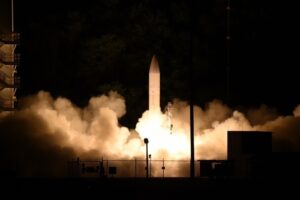The Army and Navy canceled a hypersonic missile test planned for March 5 at Cape Canaveral Space Force Station in Florida following an issue flagged during pre-flight checks, lead program officials said Friday.
Vice Adm. Johnny Wolfe, the Navy’s director of strategic systems programs, told the House Armed Services Strategic Forces Subcommittee that further testing will continue once the cause of the issue “is identified and corrected.”

“During a recently planned flight test, automated pre-flight checks identified that a battery did not activate which resulted in not conducting the test. We are aggressively investigating the cause of the no test and will continue to move forward with our development and additional testing in support of Army fielding as soon as the cause is identified and corrected,” Wolfe said during his opening remarks at the hearing.
The scrapped test, first reported by Florida Today, is part of the Army and Navy’s ongoing joint effort to develop hypersonic weapons, which will support their respective Long Range Hypersonic Weapon (LRHW) and Conventional Prompt Strike (CPS) programs.
“We are still in the process of processing and analyzing the data we received at that event. But Vice Adm. Wolfe and I will field as many of your questions as possible this morning, especially in the closed session,” Lt. Gen. Robert Rasch, the Army’s director for hypersonics, directed energy and space, told the panel. “Above all, however, I am confident in our team and we will persevere together to get this system capable and safe for fielding to our soldiers.”
The Army’s LRHW and Navy’s CPS will share the same all-up missile round and canister as well as the Common Hypersonic Glide Body, which was designed by the Navy with production handled by the Army.
In 2019, the Army chose Lockheed Martin [LMT] to serve as the weapon systems integrator for the LRHW, which will be fired from a truck, while Dynetics [LDOS] is tasked with producing the C-HGB (Defense Daily, Aug. 30, 2019).
The Navy announced in late October it was conducting a second High Operational Tempo for Hypersonics flight campaign to further hypersonic weapon development, to include bringing in experimental payloads that “provided data on the performance of materials and systems in a realistic hypersonic environment” (Defense Daily, Oct. 26 2022).
“By leveraging joint developmental test opportunities, the programs have marked significant testing milestones at a consistent pace,” Wolfe said on Friday.
The Navy on Feb. 15 awarded Lockheed Martin a nearly $1.2 billion contract for hypersonic, boost-glide phase Conventional Prompt Strike (CPS) missiles on Zumwalt-class destroyers, which could be worth $2.2 billion if the service exercises options (Defense Daily, Feb. 17).
Army Secretary Christine Wormuth confirmed in late February the service remains on track to field its first LRHW battery this fall (Defense Daily, Feb. 27).
Rasch told the panel that, following delivery of LRHW ground equipment in September 2021, the unit at Joint Base Lewis-McChord in Washington that will operate the first battery has completed its new equipment training and has participated in multiple joint test events “in which they demonstrated and displayed full employment of the system in a combat-like environment.”